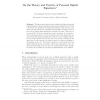Free Online Productivity Tools
i2Speak
i2Symbol
i2OCR
iTex2Img
iWeb2Print
iWeb2Shot
i2Type
iPdf2Split
iPdf2Merge
i2Bopomofo
i2Arabic
i2Style
i2Image
i2PDF
iLatex2Rtf
Sci2ools
101
click to vote
PKC
2009
Springer
2009
Springer
On the Theory and Practice of Personal Digital Signatures
We take a step towards a more realistic modeling of personal digital signatures, where a human user, his mobile equipment, his PC and a server are all considered as independent players in the protocol, and where only the human user is assumed incorruptible. We then propose a protocol for issuing digital signatures on behalf of the user. This protocol is proactively UC-secure assuming at most one player is corrupted in every operational phase. In more practical terms, this means that one can securely sign using terminals (PC's) that are not necessarily trusted, as long as the mobile unit and the PC are not both corrupted at the same time. In other words, our solution cannot be broken by phising or key-logging via the PC. The protocol allows for mobile units with very small computing power by securely outsourcing computation to the PC and also allows usage of any PC that can communicate properly. Finally, we report on the results of a prototype implementation of our solution.
Related Content
| Added | 25 Nov 2009 |
| Updated | 25 Nov 2009 |
| Type | Conference |
| Year | 2009 |
| Where | PKC |
| Authors | Gert Læssøe Mikkelsen, Ivan Damgård |
Comments (0)

